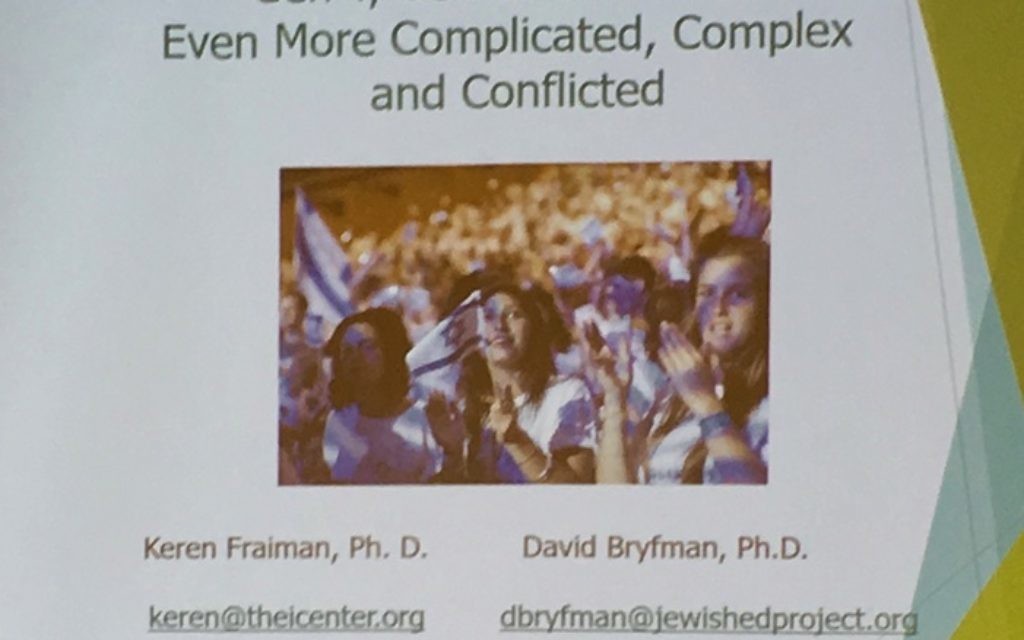Unfiltered Facts Can Link Younger Jews, Israel
Classroom discussions about Israel are necessary and should not simply be reactions to the inevitable crises.
Keren Fraiman and David Bryfman took on the challenge of unpacking the relationship of American teenagers and young adults to Israel during a breakout session at the United Synagogue of Conservative Judaism biennial Sunday afternoon, Dec. 3, at the Marriott Marquis in downtown Atlanta.
The topic baffles and bewilders older Jews who grew up with the backdrop of the Holocaust and new Israeli statehood, and it requires the understanding that younger American Jews grew up in vastly different circumstances.
While the faith in and devotion to Israel have been historically steadfast and absolute for many Americans, the allegiance of Generations Y (those in their 20s and 30s, often referred to as millennials) and Z (teenagers, born in 2000 and later) is much more nuanced.
Get The AJT Newsletter by email and never miss our top stories Free Sign Up
For the USCJ audience, the emphasis placed on tikkun olam (repair of the world), human rights, and social justice and activism among Conservative Jewry profoundly influences people’s worldview. No longer directly exposed to the issues of survival and the necessity for a Jewish homeland, young Jews coming largely from liberal or socially progressive backgrounds and universities naturally struggle with the Israeli-Palestinian conflict, equal rights at the Western Wall, and disputes between the Diaspora and Israel regarding religious observance and Israeli government.
Bryfman, the chief innovation officer at the Jewish Education Project, a Schusterman fellow and a research fellow at the Shalom Hartman Institute, said: “Non-Orthodox Jews are liberals. … There are exceptions, but I’m a sociologist, so I look at generalizations.”
Some Orthodox youths are liberal, he said, but in the range of 90 percent of social progressives will vote liberal on all major issues.
“Popular culture cannot be underestimated,” he said. Young people get their news from social media, where they only follow people whose values, opinions and beliefs run in tandem with theirs.
By the algorithm of social media, Bryfman said, “your news cycles are fed by people only like you. It’s called confirmation bias. So now you’ve got young Jews, social progressives, only learning from people like them about the world in which they live today.”
Regardless of whether what they see is “fake news,” it’s their news.
Bryfman showed that Israel is low and dropping in the minds of young people today because of this liberal bias. “The less connected you are to Jewish life today, the more what you know about Israel is what you see on news and through your social media feeds. Therefore, the more you know about Israel is primarily about the Arab-Israeli conflict, especially the conflict with the Palestinian people. … As we know, most media presents Israel in this situation as the occupier and the Palestinians as the oppressed people.”
Bryfman concluded that it is logical for young Jews today to make these negative links, given their liberal bias and the environment in which they live.
Compounding that limited knowledge is that all these young Jews know of Israeli leadership is Benjamin Netanyahu, the conservative Likud party and its aggressive settlement policy.
“That part is their reality, and now our job as educators is to see how we’re actually going to try to include them in the discourse,” Bryfman said.
He concluded that complete apathy would be a problem, but in this case the challenge for the Jewish community is to accept these shifts and engage with young people who have passionate opinions, although they may differ from those of their elders.
Because of their environment and exposure, Generations Y and Z tend to reject the unquestioning devotion to Israel exhibited by earlier generations.
“We are failing them when we continue to infantilize the education we provide them,” said Fraiman, the director of evaluation and research at the iCenter for Israel Education and a former Schusterman Israel scholar and officer in the Israel Defense Forces.
In response to the demand for conflict education in 2014 after the most recent Gaza war, the iCenter received a grant to create a more holistic approach. Conflict education is “not an add-on or something that does or should happen later,” Fraiman said. “It’s part of the story.”
The philosophy is to fully explain the history so that an open and honest connection can develop between learners and Israel, feeding their natural curiosity “to allow them to develop deep relationships that we hope for them, but part of that is conflict.” It is an unedited education without the sugarcoating.
As teens struggle with many aspects of their education, ranging from American history to politics, their educators are learning to engage in conversation in the classroom. The same should hold true for Jewish educators. The discussions about Israel are necessary and urgent and should not come as a reaction as the inevitable crises arise.
Jewish educators at the session had many questions about revealing aspects of conflict while trying to engender a love for Israel. In addition, there was a concern about the reaction to such unfiltered education. What type of phone calls would the educators have to field from parents, board members and school administrators?
The iCenter tried to pinpoint “the complexities and nuances of the conflict that we want our learners to understand” and came up with recurring themes on which to shed daylight, such as diverse narratives about the founding of Israel, Arab labor and different paths to peace. Those themes enable open conversation within the “Jewish and universal values” that resonate with younger Jews, and, in this case, the students are getting their news from a reliable source.
Values-based conversations empower the educator and the learner and allow for parallels to be drawn between American history and the Israeli experience, Fraiman said. “We must create space for these conversations, or we’ll lose them.”





comments